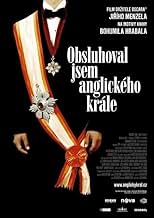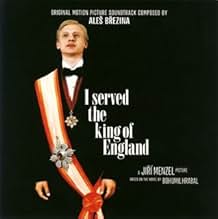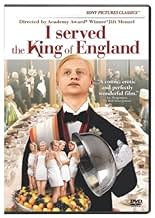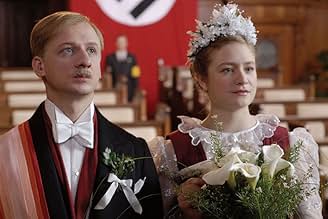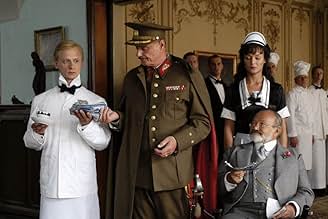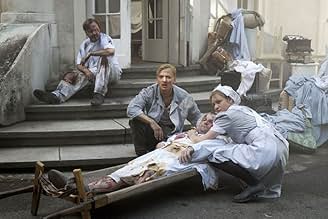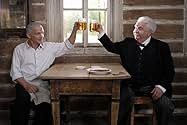AVALIAÇÃO DA IMDb
7,3/10
8,4 mil
SUA AVALIAÇÃO
Adicionar um enredo no seu idiomaA look at the glamorous life at an old-world Prague hotel.A look at the glamorous life at an old-world Prague hotel.A look at the glamorous life at an old-world Prague hotel.
- Direção
- Roteiristas
- Artistas
- Prêmios
- 12 vitórias e 13 indicações no total
- Direção
- Roteiristas
- Elenco e equipe completos
- Produção, bilheteria e muito mais no IMDbPro
Avaliações em destaque
this is a farce in part, but i do wonder why there's the great American need to qualify this movie. so one will know the correct response, perhaps? aw, just sit back and be enlightened. if more folks had laughed at the Nazis they wouldn't have made it into power. and as for the woman being portrayed as lesser than the man, this is called history, folks. the movie is charming. barney is a mime's delight. and the sex is delicious, and certainly not raunchy as one reviewer on the DVD writes. i always find it stimulating to have to curb my love of MTV editing and car chases and to let the different pace of the European style wash over me. ah tempora, ah mores.
Obsluhoval jsem anglického krále (Jiří Menzel, 2006, 2h00) is very hard a movie to write on. Obviously, Bohumil Hrabal squares things up with Czech history or nationalism. His main character, brilliantly set up by Jiří Menzel (let's remember "Trains closely watched" and "The Aventures of private Ivan Tchonkin") is a sort of naive though ambitious petty crook, almost reaching his aim transformed into an ideal (becoming a millionaire) until History catch him back, after February 1948.
An older man, though not broken, is opening the movie : Jan is freed after serving 15 years ("which, thanks to amnesty, became 14 years and 9 months") in state prison. We follow older Jan Dite in Sudentenland, now a desert since Germans were expelled after WWII. He remembers his rise - mainly through women, generally whores, caring with him because his charm et his sweetness and invention in bed. This is the center of numerous flash-backs making the bigger part of the film. Nothing wrong to say about musical score, special effects (delicate and charming), casting (all women are beautiful), acting, filming and editing. Everything works, no flaws.
The problem, if there is a problem, lies in the hero and almost all of the characters he is mixed with : all are of a rather repulsively vulgar cynicism, which becomes the philosophy Jan uses to transform his first poor dream into an ideal. And those who are not of this kind are lead by nationalism - narrow minded (the Czechs) or hideous (the Nazi school-mistress Jan falls for). Oddly enough, the only one redeemed for us is the head waiter in Hotel Paris, who is Czech, righteous and courageous. Is it to tone down Hrabal's thesis?
So the whole story looks like an enormous bitter (and sophisticated) farce Menzel filmed on behalf of Hrabal's feelings.
Besides, there is still something in the movie, which make its vision not one-sided : a bitter-sweet taste given by the face of mature if not old men in front of women beauty, and the visible and overwhelming nostalgia this beauty vivify in their mind. They remember, and they smile... Isn't it there some kind of a sketch, the sketch of a how-to-grow-old handbook?
An older man, though not broken, is opening the movie : Jan is freed after serving 15 years ("which, thanks to amnesty, became 14 years and 9 months") in state prison. We follow older Jan Dite in Sudentenland, now a desert since Germans were expelled after WWII. He remembers his rise - mainly through women, generally whores, caring with him because his charm et his sweetness and invention in bed. This is the center of numerous flash-backs making the bigger part of the film. Nothing wrong to say about musical score, special effects (delicate and charming), casting (all women are beautiful), acting, filming and editing. Everything works, no flaws.
The problem, if there is a problem, lies in the hero and almost all of the characters he is mixed with : all are of a rather repulsively vulgar cynicism, which becomes the philosophy Jan uses to transform his first poor dream into an ideal. And those who are not of this kind are lead by nationalism - narrow minded (the Czechs) or hideous (the Nazi school-mistress Jan falls for). Oddly enough, the only one redeemed for us is the head waiter in Hotel Paris, who is Czech, righteous and courageous. Is it to tone down Hrabal's thesis?
So the whole story looks like an enormous bitter (and sophisticated) farce Menzel filmed on behalf of Hrabal's feelings.
Besides, there is still something in the movie, which make its vision not one-sided : a bitter-sweet taste given by the face of mature if not old men in front of women beauty, and the visible and overwhelming nostalgia this beauty vivify in their mind. They remember, and they smile... Isn't it there some kind of a sketch, the sketch of a how-to-grow-old handbook?
Menzel's film is a modern masterpiece. It tells the story of one man's fate, as seen through the mythical pen of Bohumil Hrabal, one of the greatest Czech writers of the 20th century. The film is interspersed with documentary footage of the occupation of the remnants of the Czech republic in 1939. It tells how one man grows up in one system, survives another, and willingly submits himself to a third (Communist). The slogan "my happiness was always in the fact that some unhappiness overtook me" belongs to the East European theater of the absurd. For those of you who have seen the amazing performance of Julia Jentsch in "Sophie Scholl - The Last Days" it will come as a surprise, if not a shock, to see Ms. Jentsch play a character exactly opposite to the one which brought her such fame -- a true blue Nazi! But that's what great actors are made of -- anti-Nazi heroine this year, Nazi lover of the main protagonist the next. She learned some Czech for this role, but when she speaks in German, the screen shows Czech subtitles. Some scenes are really priceless, as when Dite is escorted out of his hotel (presumably in 1948), by two members of the Communist people's militia who at first are inclined to allow him to stay on as administrator of his now nationalized enterprise, but when he keeps insisting he is a millionaire and needs to be arrested, they willingly oblige. Irony stays with us through the film, starting with the opening scene when the elder Dite is released from a Communist jail in Prague and he explains: "I was sentenced to 15 years (for being a millionaire), but because of the amnesty, I only had to sit for 14 and 3/4."
Menzel, faithful to Hrabal, shows the Fall of Czech Man - and Sudeten German Woman - and their expulsion from their respective Middle-European idylls: They tragically fall into each other's arms just as global issue is joined that soon disillusions our Romeo and destroys his (now unfortunately rampantly Nazi) Juliet.
Neither the quiet life of getting rich and enjoying all the pleasures money can bring, nor the stirring Wagnerian strains of Germanic supremacist idealism, can survive, but our opportunistic anti-hero, Ditie (a name which can translate as 'little man') is more adaptable, because his ideals are more pliant to the accidents of fate than his German wife's rigid Hitlerite fanaticism, and consequently he is eventually able to emerge from a sort of Communist Purgatory with a keen appreciation of life's real and much simpler necessities.
With profound irony, it is in a smashed and ethnically cleansed Sudeten German village that an older and a wiser Ditie's rehabilitation is completed. And it is from this sobering perspective that he can finally both regret the excesses and errors of his life, and yet also take nostalgic pleasure from what was, after all, the wonderful, glittering, profoundly human spectacle of folly and grandeur which his life has been! Far from tragic or depressing, therefore, this film of the 20th century debacle of a nation ruined remarkably concludes with a very Czech endorsement of the simple, inoffensive pleasure in life which will always console this patient people at the troubled heart of darkest Europe: Ditie allows himself to enjoy a tankard of Pilsener beer - and Menzel's camera seems to gild the moment with as much gloriously sensuous golden dreaminess and spiritual fulfillment as ever bloated millionaire or romantically excessive idealist knew.
At last, the little man has found his fulfillment where it always lay: in the little things. At last, old, disillusioned and unseduced any longer by the world's headier attractions, Ditie finds himself at home and happy.
Here, the film seems to be saying, is the real idyll to which the Czech person should retire for refreshment of the soul, and not those false - though fabulous - ones we have been forced to discard.
Just as Ditie observes that his own career of accidents always turned out well, so in this perspective the Czech experience seems, on the whole, to have turned out for the best. This optimistic fatalism seems typical of the Czech way of seeing things, and is as characteristic of this film of Menzel's old age as it was of his early masterpiece, 'Closely observed trains.' On this view, it would be churlish to condemn the film for self-indulgence, as many Western critics have done. Frankly, they haven't suffered so much, so what do they know of ethical conundrums and the moral paradoxes of survival? This meditation on the more inglorious struggles of the insignificant and friendless to survive deserves our respect, not an easy and priggish contempt. This must especially be true in the country which lies behind the heavily loaded title 'I served the King of England,' for this heavy hint must surely prick that particular national conscience with its role in one of history's most blatant acts of betrayal. The title practically dares any English commentator to judge Ditie in his historical predicament!
(There is also considerable satisfaction to be had by the viewer from the sheer technical finesse of the film's production, on every level. Jiri Menzel's craft is also hugely impressive in scene after scene, which are turned with complete mastery of tragi-comic effect. But this is a study for another occasion.)
Neither the quiet life of getting rich and enjoying all the pleasures money can bring, nor the stirring Wagnerian strains of Germanic supremacist idealism, can survive, but our opportunistic anti-hero, Ditie (a name which can translate as 'little man') is more adaptable, because his ideals are more pliant to the accidents of fate than his German wife's rigid Hitlerite fanaticism, and consequently he is eventually able to emerge from a sort of Communist Purgatory with a keen appreciation of life's real and much simpler necessities.
With profound irony, it is in a smashed and ethnically cleansed Sudeten German village that an older and a wiser Ditie's rehabilitation is completed. And it is from this sobering perspective that he can finally both regret the excesses and errors of his life, and yet also take nostalgic pleasure from what was, after all, the wonderful, glittering, profoundly human spectacle of folly and grandeur which his life has been! Far from tragic or depressing, therefore, this film of the 20th century debacle of a nation ruined remarkably concludes with a very Czech endorsement of the simple, inoffensive pleasure in life which will always console this patient people at the troubled heart of darkest Europe: Ditie allows himself to enjoy a tankard of Pilsener beer - and Menzel's camera seems to gild the moment with as much gloriously sensuous golden dreaminess and spiritual fulfillment as ever bloated millionaire or romantically excessive idealist knew.
At last, the little man has found his fulfillment where it always lay: in the little things. At last, old, disillusioned and unseduced any longer by the world's headier attractions, Ditie finds himself at home and happy.
Here, the film seems to be saying, is the real idyll to which the Czech person should retire for refreshment of the soul, and not those false - though fabulous - ones we have been forced to discard.
Just as Ditie observes that his own career of accidents always turned out well, so in this perspective the Czech experience seems, on the whole, to have turned out for the best. This optimistic fatalism seems typical of the Czech way of seeing things, and is as characteristic of this film of Menzel's old age as it was of his early masterpiece, 'Closely observed trains.' On this view, it would be churlish to condemn the film for self-indulgence, as many Western critics have done. Frankly, they haven't suffered so much, so what do they know of ethical conundrums and the moral paradoxes of survival? This meditation on the more inglorious struggles of the insignificant and friendless to survive deserves our respect, not an easy and priggish contempt. This must especially be true in the country which lies behind the heavily loaded title 'I served the King of England,' for this heavy hint must surely prick that particular national conscience with its role in one of history's most blatant acts of betrayal. The title practically dares any English commentator to judge Ditie in his historical predicament!
(There is also considerable satisfaction to be had by the viewer from the sheer technical finesse of the film's production, on every level. Jiri Menzel's craft is also hugely impressive in scene after scene, which are turned with complete mastery of tragi-comic effect. But this is a study for another occasion.)
The works of Czech director Jiri Menzel constitute a tasty cocktail of humanism and laughter. In this film, the cocktail is personified in the words spoken by the narrator and lead character early in the film: "It was always my luck to run into bad luck." Menzel's innocent male country bumpkins have simplistic goals in life-get rich and charm the beautiful woman in their horizon. His films remind you of the social satire embedded in the works of Charles Chaplin and the visual gags in the cinema of Buster Keaton. Only Menzel's body of work has a dose of moral ambiguity.
While Menzel's cinema is often mistaken as being solely his own genius, he actually rides on the shoulders of three major literary giants of the former CzechoslovakiaBohumil Hrabal, Vladislaw Vancura, and Zedenek Sverak. Menzel's cinema provides a convenient "easy read." of the fine literary tradition to which Milan Kundera belongs by bringing alive on screen slivers of statements and observations recorded by these novelists. Menzel's true gift is making the written word look attractive on screen with the use of imaginative visual gags. The spoken words (the writer's contribution) and carefully chosen actors serve as the pivot to enjoy the visual feast in Menzel's cinema. His mastery of visual comedy has made a major difference to Czech cinema being associated with comedy rather than drama, quite unlike other East European cinema where tragedies and serious drama overshadowed the comedy genre.
This film happens to be the sixth work of Hrabal that Menzel has adapted on screen-the first being "Closely watched trains."
Politicians find satire uncomfortable. It is not surprising that Hrabal's novel "I served the King of England" was banned for years. When ultimately Menzel made it into a movie in 2006 using Hrabal's script, it won the FIPRESCI prize at Berlin. Menzel's cinema (and Hrabal's novels) has considerable political and social criticism. The film opens with clemency/pardon given to a prisoner who has almost completed his jail term. Communist political bigwigs wish to ape the capitalists, without a clue of what is required to gain social respect. Hrabal's script is clearly critical of the communist regime: "People who said social work was ennobling were the same men who drank all night and ate with lovely young women seated on their knees.' Butlers act superior to their new masters who do not know social etiquette. The new Czech communist politicos bend over backwards to please any one with the remotest Russian credentials. It is no small wonder that Hrabal got into trouble with the authorities until the political regime changed in recent years.
Apart from political criticism, social criticism of Czechs get liberally dished out in the film. When the physically short-statured waiter Jan Dite (literally translated as Johnny Child) throws coins on the floor for fun, rich and poor Czechs crawl without social distinction on the floor to pick up the money, allowing the short-statured waiter to look down at those he was serving and emerge physically and socially "tall" for a brief period. There is another line that Hrabal/Menzel uses to describe Czechs and their actions over the decades "Czechs do not fight warstherefore we were not invaded, we were annexed." These are lines that will make many laugh, but these lines could make the author/ the director unpopular with a few who cannot take self criticism.
The quest for money and riches underpin this film in particular and much of Menzel's cinema. The film has the lead character selling sausages at a railway station. So engrossed is he in counting the change he has to return to a customer who has given him a big bank note, that the train pulls out with the angry customer fuming that he has been cheated. But Hrabal and Menzel had together done a similar scene in "Closely watched trains" where a train pulls out as the young hero is about to kiss his love with eyes closed, taking away his beloved girl whose eyes are open and is agitated that the kiss was missed.
Money is a recurring theme in "I served the King of England." The hero dreams of being a millionaire. One colorful character keeps himself amused spreading out cash on the floor like a carpet. Money is what waiter's get if he is good and smart, enough to buy up the hotel. He gets a medal from an Ethiopian Head of State, modeled on the physical attributes of Haile Selassie; merely because he can bend down to receive it. He gets a fat tip because he is physically near to a rich guest doling out his largesse.
After one has laughed sufficiently, one could reflect on the less obvious but darker side of Hrabal/Menzel's contribution to cinema. The women are lovely to look at. They bear a striking common factorthey are to be won. They are to be used, often as useful commodities. One Nazi girl even makes love, thinking of Hitler during the act. You do not see Hrabal and Menzel developing the women characters as they do their male ones. In this film, the anti-hero is dismissed from his job because he is not a good Czech.
"I served the King of England" are the spoken credentials of a respected waiter in the film as he trains the lead character of the film. Yet, the film is about a successful Czech who became a millionaire as he had dreamt, who married a Nazi and had enjoyed life when other Czechs were being led to the gas chambers, and was imprisoned when the Communists came to power. Hrabal and Menzel may have given us great comedy over six films. Evaluate the content closely and there is more to their work than pure comedy.
While Menzel's cinema is often mistaken as being solely his own genius, he actually rides on the shoulders of three major literary giants of the former CzechoslovakiaBohumil Hrabal, Vladislaw Vancura, and Zedenek Sverak. Menzel's cinema provides a convenient "easy read." of the fine literary tradition to which Milan Kundera belongs by bringing alive on screen slivers of statements and observations recorded by these novelists. Menzel's true gift is making the written word look attractive on screen with the use of imaginative visual gags. The spoken words (the writer's contribution) and carefully chosen actors serve as the pivot to enjoy the visual feast in Menzel's cinema. His mastery of visual comedy has made a major difference to Czech cinema being associated with comedy rather than drama, quite unlike other East European cinema where tragedies and serious drama overshadowed the comedy genre.
This film happens to be the sixth work of Hrabal that Menzel has adapted on screen-the first being "Closely watched trains."
Politicians find satire uncomfortable. It is not surprising that Hrabal's novel "I served the King of England" was banned for years. When ultimately Menzel made it into a movie in 2006 using Hrabal's script, it won the FIPRESCI prize at Berlin. Menzel's cinema (and Hrabal's novels) has considerable political and social criticism. The film opens with clemency/pardon given to a prisoner who has almost completed his jail term. Communist political bigwigs wish to ape the capitalists, without a clue of what is required to gain social respect. Hrabal's script is clearly critical of the communist regime: "People who said social work was ennobling were the same men who drank all night and ate with lovely young women seated on their knees.' Butlers act superior to their new masters who do not know social etiquette. The new Czech communist politicos bend over backwards to please any one with the remotest Russian credentials. It is no small wonder that Hrabal got into trouble with the authorities until the political regime changed in recent years.
Apart from political criticism, social criticism of Czechs get liberally dished out in the film. When the physically short-statured waiter Jan Dite (literally translated as Johnny Child) throws coins on the floor for fun, rich and poor Czechs crawl without social distinction on the floor to pick up the money, allowing the short-statured waiter to look down at those he was serving and emerge physically and socially "tall" for a brief period. There is another line that Hrabal/Menzel uses to describe Czechs and their actions over the decades "Czechs do not fight warstherefore we were not invaded, we were annexed." These are lines that will make many laugh, but these lines could make the author/ the director unpopular with a few who cannot take self criticism.
The quest for money and riches underpin this film in particular and much of Menzel's cinema. The film has the lead character selling sausages at a railway station. So engrossed is he in counting the change he has to return to a customer who has given him a big bank note, that the train pulls out with the angry customer fuming that he has been cheated. But Hrabal and Menzel had together done a similar scene in "Closely watched trains" where a train pulls out as the young hero is about to kiss his love with eyes closed, taking away his beloved girl whose eyes are open and is agitated that the kiss was missed.
Money is a recurring theme in "I served the King of England." The hero dreams of being a millionaire. One colorful character keeps himself amused spreading out cash on the floor like a carpet. Money is what waiter's get if he is good and smart, enough to buy up the hotel. He gets a medal from an Ethiopian Head of State, modeled on the physical attributes of Haile Selassie; merely because he can bend down to receive it. He gets a fat tip because he is physically near to a rich guest doling out his largesse.
After one has laughed sufficiently, one could reflect on the less obvious but darker side of Hrabal/Menzel's contribution to cinema. The women are lovely to look at. They bear a striking common factorthey are to be won. They are to be used, often as useful commodities. One Nazi girl even makes love, thinking of Hitler during the act. You do not see Hrabal and Menzel developing the women characters as they do their male ones. In this film, the anti-hero is dismissed from his job because he is not a good Czech.
"I served the King of England" are the spoken credentials of a respected waiter in the film as he trains the lead character of the film. Yet, the film is about a successful Czech who became a millionaire as he had dreamt, who married a Nazi and had enjoyed life when other Czechs were being led to the gas chambers, and was imprisoned when the Communists came to power. Hrabal and Menzel may have given us great comedy over six films. Evaluate the content closely and there is more to their work than pure comedy.
Você sabia?
- CuriosidadesThe scenes for the Hotel Pariz restaurant were filmed in the main restaurant in Prague's Obecni Dum (Civic House), just around the corner from the actual Hotel Pariz. Both restaurants were designed in the Art Nouveau style by artist Alphons Mucha, but the Obecni Dum restaurant is larger.
- Erros de gravaçãoJan sees a train full of people being deported to a concentration camp. A closeup of one of the cars shows men within wearing gray and white striped uniforms. However, deportees were sent to the camps wearing their civilian clothes and weren't issued uniforms until after they arrived.
- Citações
Jan Díte, older: A person becomes most human, often against his own will, when he begins to founder, when he is derailed and deprived of order.
- ConexõesEdited into CzechMate: In Search of Jirí Menzel (2018)
Principais escolhas
Faça login para avaliar e ver a lista de recomendações personalizadas
- How long is I Served the King of England?Fornecido pela Alexa
Detalhes
- Data de lançamento
- Países de origem
- Centrais de atendimento oficiais
- Idiomas
- Também conhecido como
- I Served the King of England
- Locações de filme
- Empresas de produção
- Consulte mais créditos da empresa na IMDbPro
Bilheteria
- Orçamento
- CZK 84.450.000 (estimativa)
- Faturamento bruto nos EUA e Canadá
- US$ 617.403
- Fim de semana de estreia nos EUA e Canadá
- US$ 53.218
- 31 de ago. de 2008
- Faturamento bruto mundial
- US$ 7.354.478
- Tempo de duração1 hora 53 minutos
- Cor
- Mixagem de som
- Proporção
- 1.85 : 1
Contribua para esta página
Sugerir uma alteração ou adicionar conteúdo ausente

Principal brecha
By what name was Eu Servi o Rei da Inglaterra (2006) officially released in Canada in English?
Responda

